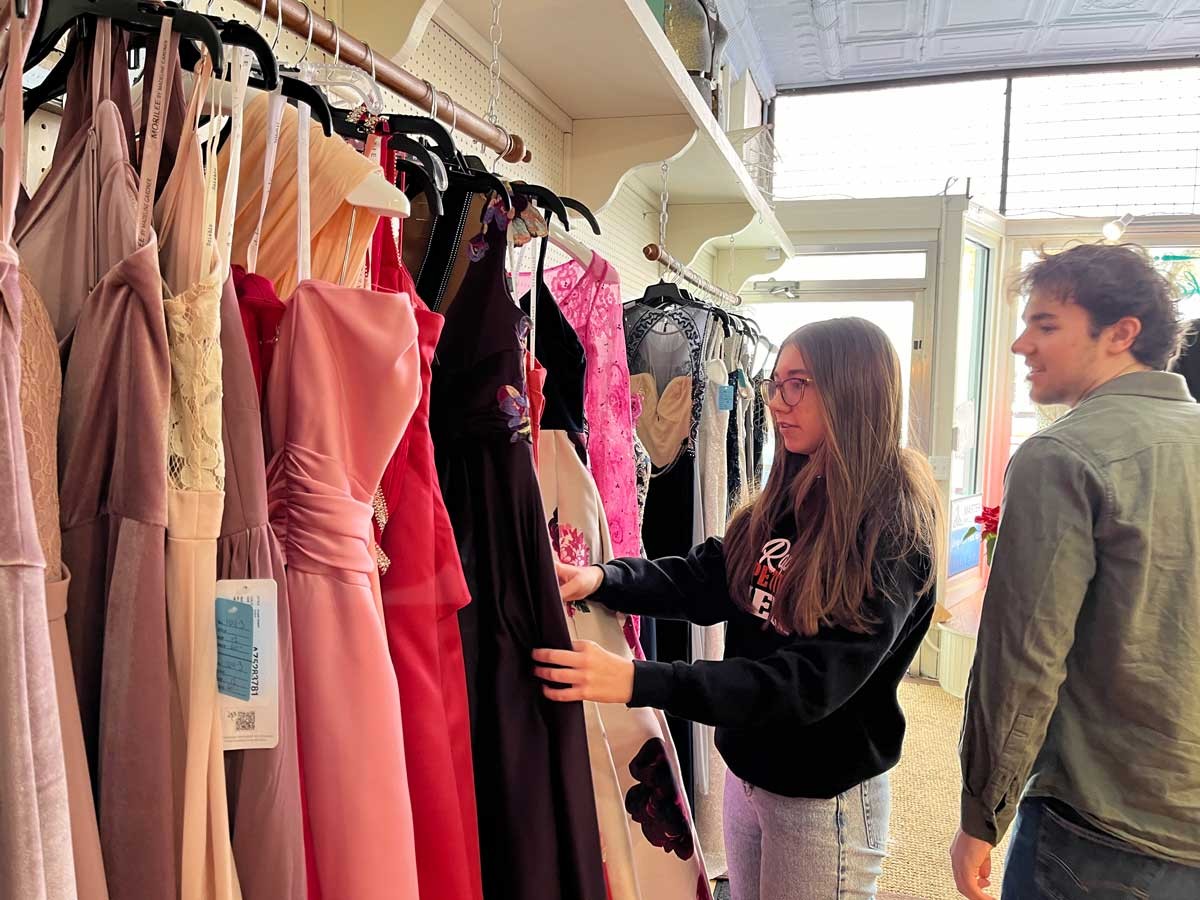This coverage is made possible through a partnership with IPR and Grist, a nonprofit independent media organization dedicated to telling stories of climate solutions and a just future.
• Elk Rapids high school students are working to cut down on fast fashion in their community — starting with prom.
• The fashion industry contributes up to 10% of global greenhouse gas emissions, produces millions of tons of waste and consumes billions of tons of water.
• Experts say such efforts can help raise awareness about the connection between buying habits, fashion and the environment.
On a Saturday in February, high school senior Kaylee Lemmien sifts through dresses at Tinker Tailor, a small shop in downtown Elk Rapids.
“I’d call this a mermaid, sequin, light blue gown with a tulle skirt. It’s got a lace-up back, kind of open,” she says. “Very pretty.”
Tinker Tailor usually alters clothes but on this day, it’s selling prom dresses.
The dresses are short and long, and come in all sorts of fabrics and adornments — neon pink satin, muted lilac, sequins, zebra stripes, rhinestones.
The garments have been donated and consigned by people around the region, with the goal of giving them a new life at prom this spring.
The Eco Club at Elk Rapids High School worked with the store and the volunteer group Green Elk Rapids to coordinate the event, called Sustainable Style. It’s an effort to cut back on fast fashion.
“Fast fashion is a trend which is driven by newness,” said Shipra Gupta, an associate professor of marketing at the University of Illinois Springfield. “It tends to treat its products like food that spoils quickly.”
Estimates of the fashion industry’s environmental and climate impacts vary; the United Nations has said the industry creates anywhere from 2% to 10% of global greenhouse gas emissions.
The Columbia Climate School has reported that the industry consumes around 93 billion metric tons of water annually, while 53 million metric tons of clothing are incinerated or thrown away. But getting accurate measurements of environmental impacts is difficult, and experts have long said there's a need for more research.
Fast fashion is especially damaging, because it encourages people to cycle through clothing quickly. And that business model has had serious implications; a 2017 Ellen MacArthur Foundation report found that clothing production had doubled between 2000 and 2015, even as the amount of times an item was worn declined.
“Fast fashion is a driver for American consumer behavior,” Gupta said.
Constantly seeing new items in stores can trigger a desire to buy more. Gupta said younger people are particularly susceptible to this, because they’re still forming and exploring their identities.
One way to shift that mindset is to focus on individual styles.
“You are more likely to buy or wear something that is true to your identity, true to your style,” she said. “You are more likely to keep it for a longer time and you are less likely to purchase as frequently as if you were a fashion-oriented consumer.”
Donating clothes isn’t necessarily environmentally friendly. For instance, if the clothes are in poor condition it can contribute to environmental pollution, because those garments often get thrown away.
In Elk Rapids, students hope that events like Sustainable Style can cut back on consumption locally, providing a responsible place to donate and buy used evening wear.
“You try really hard to be eco-friendly — don’t use single-use plastic, recycle, compost — everything,” Macaluso said.
But sometimes there aren’t any options, especially in small towns.
“Then you kind of have to drive to Grand Rapids, and you have to go to a mall and you have to buy a new dress,” she said. “So I think this just provides another option. Another opportunity to say, ‘Oh, I have a chance here to help the environment a little bit. So I'm going to take it.’”
In the past, students searched far and wide for dresses, traveling to hubs like Grand Rapids, a two-hour drive south.
Kaylee Lemmien, who was shopping for dresses and is also a member of the Eco Club, said that along with reducing the need to buy new garments it creates an opportunity to stay closer to home.
“Not having to go down to Grand Rapids and spend that money on gas and do all of that stuff is really, really nice and freeing,” she said. “This is just such a cool idea.”
Perhaps most importantly, initiatives like these can help others think about how fashion impacts the environment.
“I think it’s very meaningful, because it starts to engage consumers, especially the young generation,” said Sheng Lu, an associate professor of fashion and apparel studies at the University of Delaware. Even though this effort is relatively small, it could help people think differently about fashion and the environment, and even inspire other communities to do the same.
And it has encouraged other community members to get involved.
“I honestly was pretty nervous coming in here,” said sophomore Addison Looney, who was shopping with her mom. “But there were a lot of great selections… I was pretty indecisive about it. But I picked it out.”
The dress is a soft lavender with beading in the front. Addison’s mom, Sara, said they were looking forward to the event.
“Knowing this is just a great opportunity to shop local, and to obviously save money,” she said. “But also just the resale aspect of it — to just kind of keep dresses going, because they're usually a one-time use.”
Macaluso, the Eco Club president, said they’ve been able to stoke interest in buying used clothing. The prom event led Tinker Tailor to set up a “Dress Vault” in the store so people can continue consigning, donating and shopping for secondhand items.
“I think it really just builds off that idea of — hey, these dresses didn’t go bad, they haven’t expired,” she said. “And they can find a new home.”
Correction: This article originally cited an often-repeated statistic that the fashion industry produces 20% of global wastewater. That statistic has since been debunked, and that statistic has been removed from this story.







